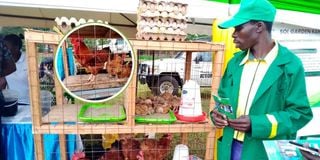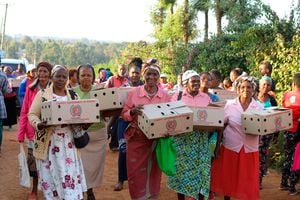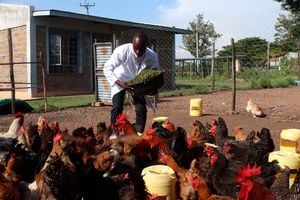
Kennedy Balozi with some of his improved kienyeji chickens in Siaya County.
A young man with a Bachelors Degree in Statistics has found solace in rearing the Improved Kienyeji chicken breed and is no longer interested in formal employment.
Kennedy Balozi, 31, a resident of Majiwa village in Bondo Sub-County, Siaya County, ventured into poultry keeping during the of the coronavirus pandemic in 2020.
As millions of Kenyans were losing jobs and incomes, Balozi saw an opportunity in improved kienyeji chicken.
“Before getting into chicken farming, I had a small college where I taught computer skills. Help mostly was from well-wishers,” Balozi says.
“I had many clients as the college was village-based and every resident wanted to have computer literate children.”
With the pandemic, mass layoffs and the government declaring night curfews and restricting movement from county to county, many companies and institutions of learning went under.
Balozi’s college attracted fewer and fewer people. He had no option than close it.
With the little money he had made from the computer teaching business, Balozi embarked on online research on rearing and selling chickens.
He built simple chicken coops for a start.
“I settled on the Improved Kienyeji breed because it is dual purpose. One can get meat and eggs from these birds,” Balozi says.
“They are also resistant to many diseases, can be sold live and are easy to manage. ”
Balozi sells three-week-old chicks, one-month-old chicks and mature birds.
A three-week-chick goes for Sh250 and one-month-old at Sh300.
On average, Balozi spends about Sh170 per chick, from hatching to three weeks. This expenditure covers food, vaccination and drugs.
He also supplies mature birds to schools, colleges, religious centres, hotels and other institutions in Bondo and neighbouring townships.
At maturity, the Improved Kienyeji chickens are bigger and heavier than other breeds.
A mature hen goes for at least Sh1,000 while a cockerel is around Sh2,000. Prices vary, depending on the size of the bird.
Feeds are readily available at local outlets. Balozi’s chickens have received glowing reviews in Siaya County.
He uses social media platforms to market his chicks, mature birds, eggs and meat.
Balozi attends exhibitions and agricultural fairs, taking advantage of such opportunities to network and market his agribusiness.
“There is always a ready market for live chickens, eggs and chicken meat. Even when given the layers’ mash, Improved Kienyeji chicken’s eggs and meat do not lose quality. Their eggs are relatively large,” Balozi says.
He gets more knowledge on the best ways of rearing Improved Kienyeji chickens through training and taking part in as many exhibitions as possible.
“I usually received several orders after attending such exhibitions,” he says.
An Improved Kienyeji hen can lay an egg daily for more than a year, with the first year being the most productive.
Balozi says one of his challenges is the cost of feed.
“A huge percentage of the production cost is on feed. I hope to buy a feed maker when I get enough money. That will greatly reduce the cost of rearing the birds,” Balozi says.
The greatest challenge, however, is competition from cheap eggs brought into the country from Uganda.
Eggs from the neighbouring country have flooded towns and villages in western Kenya, driving many chicken farmers out of business.
To beat such competition, Balozi and other chicken farmers have been pleading with the government to reduce taxes on feed and feed raw materials.










